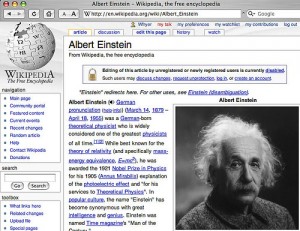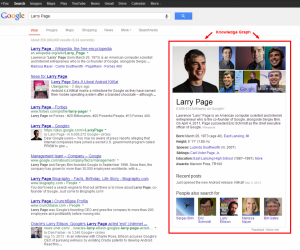03
How to use Wikipedia for SEO and Link Creation

Image Credit: http://whiteboardcreations.com/wp-content/uploads/2014/06/wikipedia-seo.gif
A lot of us out there in the SEO world are often wondering whether or not is it correct to use Wikipedia for SEO purpose. If you ask me, my answer will always be – yes!
Wikipedia undoubtedly is amidst the most visited websites on the internet. Its importance as an authority website is unparalleled. At this point it is really worth pondering how many times Wikipedia shows up in the first three or four search results on Google.
It provides unbiased and near correct information to millions of visitors every day. Wikipedia is therefore a major online traffic source, which is waiting to be used for their advantage by SEO experts. Using Wikipedia for SEO is not as easy as it may seem, you cannot just jump over to Wikipedia and check how many times you can stuff in your links in different articles.
Yes, Wikipedia is one of the finest and most effective link building sources out there, but before you can use Wikipedia to your advantage, there are many things that you need to keep in mind.
- Wikipedia is basically a non-profit organization, so it doesn’t work for financial gains. Its primary objective is to provide readers with unbiased, neutral and accurate information. Studies have revealed, information on Wikipedia is nearly as accurate as Encyclopedia or Britannica and that there are billions of users on the website. The stats are good to suggest Wikipedia as an online information giant
- Wikipedia doesn’t give out any link juice; all the links on Wikipedia are “nofollow”
- Wikipedia does not want you to add links with which you are personally associated with you in any way
- Wikipedia can add your site to spam list if links to your website are continuously added to articles on Wikipedia



Image Credit: http://www.mashinie.com/wp-content/uploads/2014/04/670x500xSmartly-Interlink-Posts.png.pagespeed.ic.KJhUCsJsiD.jpg
How can you use Wikipedia for your SEO advantage?
Basically put, Wikipedia backlink will not add value to your site. But yes, you can still gain with exposure and keyword ranking. Most Internet Marketing experts, like myself thus suggest:
“Value is not really the question, it’s how you get your links on Wikipedia pages to benefit from other things.“
When it comes to ranking for a specific keyword, your website may not rank well for it, but your Wikipedia page with a link for the keyword will be able to rank fairly high. This does not mean you start creating Wikipedia page for every keyword, it is only beneficial if it happens organically. The main focus of an SEO professional should be to add content, and not links. Links should be secondary to content, especially when you’re dealing with Wikipedia.
- The content you upload on Wikipedia should be unbiased and completely accurate.
- Start by editing few related articles and then move to the target article.
- When adding links, be inconspicuous and focus on linking multiple website.
- Do not stick to adding links to your website alone, try and include links to few other credible sources as well.
- It is also advisable not to try and add all your links at once, it should be a gradual process and should look organic.
How to create a Wikipedia page?
Image Credit: http://3.bp.blogspot.com/-Tzw6V4Znr4k/UU9bAaip2YI/AAAAAAAACf0/mF4apytis9o/s1600/imonwikipdia.png
Anyone looking to create a brand new page on Wikipedia must proceed with caution. A Wikipedia page for your company, brand or agency is extremely valuable; it can lend credibility and make you reachable on the internet. Moreover, customers searching for you on
Wikipedia feel impressed and consider your organization to be big and legitimate. Wikipedia encourages new pages on brands, which have not been written about previously. But the brand or company you are writing about should have history of being in mainstream media and the evidence should be available online.
Most SEO executives must have tried to create new pages and place their site’s link(s) on it. In most cases, fanatical Wikipedia editors must have removed it. Why does this happen? It is because the external link you provided is of little use to the community and only benefits you.
You should not let this deter you. If you have a website that can be recognized as a resource in its domain. And if you see that Wikipedia does not have a page on the topic you cover, you should venture into creating a page and gain SEO benefits from the link(s) you place in the article.
Here is how you can get down to create a compliant Wikipedia page:
- Become a trusted contributor: You cannot get around this, if you are planning to make an edit to existing Wikipedia content, or you plan to add a new page; you need to sign in as user.
- Login: After creating an account, login to Wikipedia. You can do this directly if you have an existing account. Search if the page already exists: Before getting down to create a page, search Wikipedia to see if the page you plan already exists. If it doesn’t exist you can go on to make the page; but if it is already made you can see the information, read it and edit if necessary.
- Category: All pages on Wikipedia should be placed in one category at least. The easiest way to find a relevant category for your page, search for similar articles and copy the category from there. You can go to the end of the page, to add category module and select your category there.
- Include multiple references: Wikipedia says it’s not a dictionary, so it requires every page to have more than a dictionary-style definition with one or no reference. It is advisable to cite at least 3-4 reference links (to credible sources) on a new page. Moreover, including the reference within the article, listing out references at the end of the articles is not considered a good practice by Wikipedia editors.
- Links other pages in Wikipedia: It is encouraged and expected of you to add references (links) of other pages within Wikipedia, which have relevance to your page content. More detailed process of creating a page can be found here, I’d like to inform that people will edit your page, sometimes in ways you may dislike. Though, Wikipedia has a policy to let you discuss if you disagree with some change, but it may not have a desirable effect on the link you had included. So, what’s the best you can do to ensure Wikipedia page retains the link to your website. The idea is simple – ensure the page linked is useful to any visitor landing on the page through Wikipedia, make sure it does not contain anything promotion or commercial. There are several reasons for your article, or the link in it, to be removed from Wikipedia, the main thing is to ensure that there is a level of neutrality. Do not include anything promotional about your brand or company on the page.
Different types of Wikipedia pages




Without saying, Wikipedia seeks neutrality. Every page or article on Wikipedia should be editorially neutral. The page cannot take sides of the organization, brand or individual it discusses. It should report both the good and bad about the topic from reliable and verifiable sources. The page cannot be promotion and must only contain factual information.
When you write an article about yourself, your agency, organization, company or brand, you have no right to control its content or the right to delete it outside Wikipedia’s normal channels. It is exciting to have an article about yourself, your company etc. on Wikipedia, but it cannot be your sales brochure. The article should not be there to promote, but to tell the world about the topic’s neutral point-of-view. Include your links only if they are useful to the community and not just you (for the sake of promotion, you can only include the link to your website).
It is because of this, most SEO experts, will tell you to ask someone with no obvious ties with you, or someone who has good reputation with Wikipedia to create a page for you or your business. This will present a neutral viewpoint.
Link between Google Knowledge Graph and Wikipedia




The introduction of Google Knowledge Graph (or Graph) is seen to have an effect on Wikipedia. It is believed that the free online encyclopedia lost about 10 percent of its page views in 2013. The Wikimedia foundation website shows that page views on English Wikipedia declined by close to 12 percent in the period between December 2012 and December 2013. The report brings out a finding that believes when people can get their answers from the search page itself, why would they want to click Wikipedia page for it.
Google Knowledge Graph Search ensures that people don’t have to click further than the search page when they are searching for companies, people, big brands etc. It may be an outside reason for decline in Wikipedia’s viewership, but there is no denying that Graphs (don’t have a box for everything). For information on most things, you still have to go to Wikipedia.
Using Broken Link Building for Wikipedia




Broken Link Building benefit
It is one of the most interesting white hat link building tactic to look up Wikipedia for all dead links. If you have a reference to the dead link, grab the opportunity and get a nofollow link from one of the most trusted website out there. You can email the site owner telling them their links with relevant Wikipedia pages. This will benefits SEOs in two ways:
- The website owner is flattered because you have helped them fix a broken link
- And you have a new backlink
“Wiki Grabber” – Introduction to tool and its advantages
Wiki Grabber, as discussed, is one of the finest tools to search for dead links. The tool is a quick way to find Wikipedia pages for non-active links, which need citations and/or dead link replacement. As an SEO you can use Wiki Grabber to your advantage to:
- Instantly reach Wikipedia pages with broken and inactive links
- Wikipedia refers to broken links as dead links. SEO can easily find the dead links on the page
- Once the dead links are found, they can be replaced with your link
Conclusion
Wikipedia, we have come to understand, is the biggest authority websites on the internet. Therefore, the best thing any SEO can do is, create backlinks from Wikipedia. Just because Wikipedia links are nofollow, shouldn’t be a reason to believe that links are not valuable.


